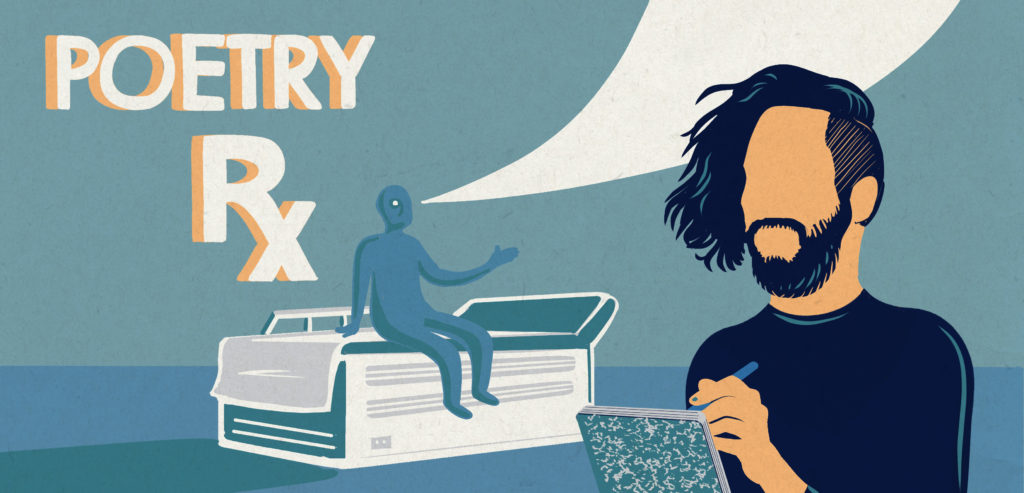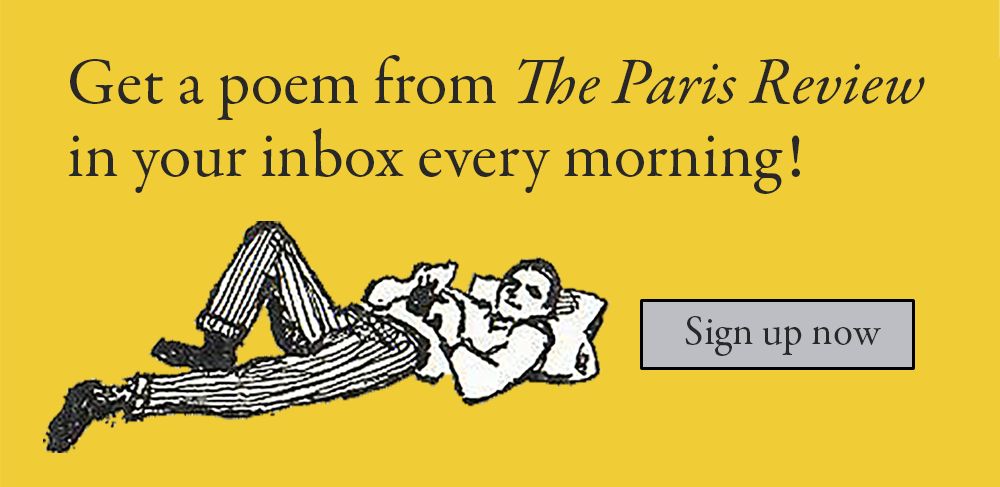In our column Poetry Rx, readers write in with a specific emotion, and our resident poets—Sarah Kay, Kaveh Akbar, and Claire Schwartz—take turns prescribing the perfect poems to match. This week, Kaveh Akbar is on the line.
Dear Poets:
I am an older man. My wife died a few years ago and I miss her terribly but I am happy with my many friends. However, I am bisexual and a much younger man has fallen in love with me. I like him very much but I feel that he deserves to have a more “appropriate” lover than me; still, I don’t want to give him up. Is there a poem that will help me enjoy his company without having to requite his love (is there a word like requite) and also allow me to not feel guilty?
Confused Unrequiter
Dear CU,
There is so much going on in your short letter. I’m so sorry you have to carry your wife’s absence—I very literally can’t imagine what that’s like, I have no experiential referent. I hope you are speaking about all this with an actual professional and not just this silly poet drinking tea at his keyboard. But, since you’ve asked me, I must step in and ask you what exactly you mean when you say the man deserves a more “appropriate” lover than you. Is this man an adult? Do you trust his intelligence? Then why should you be the arbiter of what he needs, what he deserves? His desire is not yours to muzzle, neither is yours deserving of muzzling.
I give you Eduardo C. Corral’s poem “To Robert Hayden” (I recommend listening to Corral read it through the link, if you’re able).
¿Te acuerdas?
I sat on the edge
of a bench,
untied my shoes.
Face down, eyes shut,
you breathed in
the aroma
of sweat & allspice
coming off
the sheets.
There is such hunger here, and you get the sense the two lovers are meeting after having each traveled separately to the desperate ends of yearning. It’s one of those magical pieces where silence feels like the poet’s true medium, language is just the negative space around it. You have been forced to build a new life out of such negative space, and it sounds like you’ve done so admirably: your happy friends are evidence of as much. But now, miracle of miracles, someone is in love with you again!
I tossed
my ring—gold,
inscribed—toward a pile
of clothes.
But the ring
dropped in the small
of your back
where it rattled
& rattled like a coin
in a beggar’s
cup.
If you don’t love him back, well, that happens sometimes, and you two can have an honest conversation about that. If you aren’t ready to date yet after your wife’s passing, that too is a conversation. But if, as I suspect is the case, you are not allowing yourself to reciprocate his love because you believe you are unsuitable for such tenderness, I suggest you reexamine your own mind—it seems to believe it knows more than the universe that gifted you with this man . You are worthy of desire. You are worthy of love. ¿Te acuerda?
-KA
*
Dear Poets,
I simply feel as if the world is big and my voice cannot be heard. I am so small that I feel like nothing. I feel as if I can’t do anything that would scream, “Look at me!” It makes me feel empty and not in control of my life. I want to know if there are any words that can help me feel like something again.
From,
A Hopeful Caterpillar
Dear Caterpillar,
This is one of those cases where the perfect poem leapt to mind immediately. Here is Stephen Crane’s “A Man Said to the Universe” in its entirety:
A man said to the universe:
“Sir, I exist!”
“However,” replied the universe,
“The fact has not created in me
A sense of obligation.”
People talk about this poem as being incredibly dreary or fatalistic, but I always feel a great deal of hope reading it—an ambivalent, non-interventionist cosmos implies our loci of control are entirely internal, our fates our own to author. Your life is a great slab of marble and look, you’re the one holding the hammer and chisel! What impossible luck! What an occasion for gratitude and courage!
-KA
*
Dear Poets,
I have been talking with my therapist about starting medication for anxiety. I have been coping with anxiety for as long as I can remember. The problem is, I am afraid of the side effects of the medication and of change (maybe even of change for the better). Anxiety is a hassle, but it has also been a life-long companion; I know what to do with it. Making change like this feels like a risk, even if it’s a risk worth taking. Is there a poem for facing this all of this unknown?
Yours truly,
Anxious for change
Dear Anxious,
I’ve always found it strange that when a person’s pancreas misbehaves, they’ll take insulin without question, when their heart is on the fritz they’ll take blood pressure meds without a second thought, but when their brain—the most complicated organ by several orders of magnitude—malfunctions, taking medication becomes an elaborate existential drama. There are billions of ways our brain chemistry can conspire against us, and I commend you for taking the first steps toward getting yours right. I understand the terror of giving up something known, even when it’s hurting you.
It’s true—some pain stays so long its absence becomes a different pain. When I got sober, I found myself facing these vast excruciating expanses of unspoken for time—no cons to set up, no deals to broker, no crises to hide from, just the immobilizing possibility of all human experience waiting for me at every blink.
For you, I’d recommend taking a look at Sarah Kay’s smart thoughts on Shira Erlichman’s work, but I also want to offer Bianca Stone’s “Reading a Science Article on the Airplane to JFK.”
And you have just eaten
a bag of cinnamon-flavored chips
and assessed that if you met
a wonderful new person
who ran from you in horror
you would fill their space
with calculated desolation.
Here is a poem that gets anxiety right—not even the most aggressively mundane activity, munching a cinnamon chip on a plane, can stop the intrusion of malicious thought cycles. “That there are bridges / not built in me. That there are areas / that do not light up.” But ultimately? The poem ends:
And you want to be good.
And you want to be liked.
And you want to recover.
A life need not be governed by dread. How wonderful! And how fortunate you are to have this opportunity to find that out for yourself.
-KA
Want more? Read earlier installments of Poetry Rx. Need a poem? Write to us! In the next installment, Sarah Kay will be answering questions.
Kaveh Akbar’s poems have appeared recently in The New Yorker, Poetry, the New York Times, the Nation, and elsewhere. His first book is Calling a Wolf a Wolf. Born in Tehran, Iran, he teaches at Purdue University and in the low-residency M.F.A. programs at Randolph College and Warren Wilson.
from The Paris Review https://ift.tt/2V0ejWY


Comments
Post a Comment